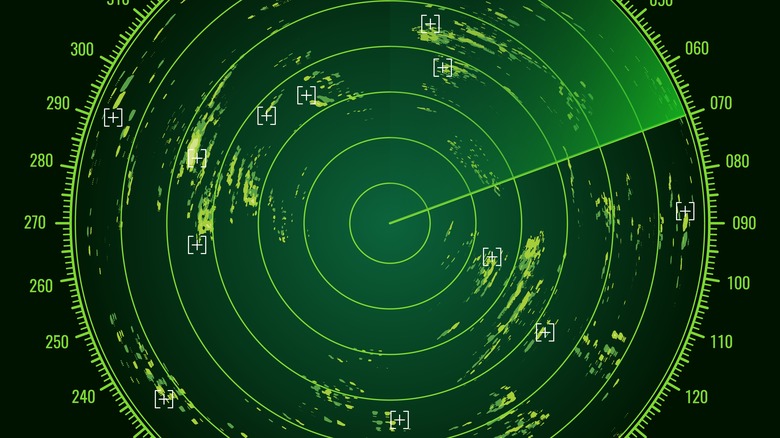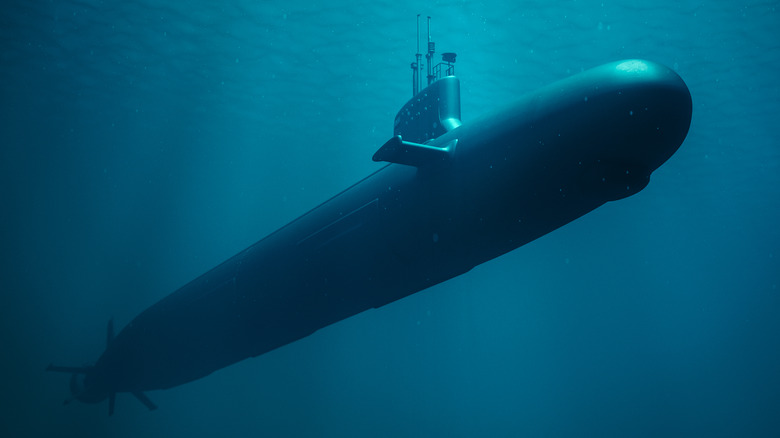The Terrifying Effects Submarine Radar Can Have On Humans
When it comes to mapping and navigating underwater environments, nothing beats sonar. You see it all the time in movies. Naval vessels send out bursts of sound and that can identify what's around them by how those sound waves bounce off objects and reflect back. Sonar screens in movies and TV even usually have a light "ping" sound effect every few seconds.
Based on their fictional interpretation, you might assume sonar is harmless and possibly even inaudible to humans. Boats and subs probably have sonar running all the time, right? After all, they're essentially running blind otherwise. Visibility underwater (especially deeper parts with little sunlight) is not exactly great, so sound waves are the only way to map the vessel's surroundings.
It turns out that's not actually the case. Sonar isn't harmless and isn't something vessels use all the time. In fact, the sound waves used in sonar sweeps can be dangerous, even deadly, especially to marine wildlife. That includes creatures found underwater that may not be native to that environment, like human divers. A sonar burst at the wrong time and place could have disastrous effects on anyone caught in the soundwave. To understand why, it's important to look at the differences between active and passive sonar, how and why naval vessels use it, and its unintended effects on underwater life.
Active vs. Passive Sonar
There are two types of sonar used by marine vessels — active and passive. They don't work like you see in movies. Passive sonar is a listening-only mode. It hears sounds traveling through the water and records data about that sound, like the pitch, frequency, and direction it came from. This can help detect marine life like whales or sharks, and it's also used in combat to detect enemies.
That latter point is why naval ships don't always use active sonar. Active sonar sends a pulse of sound that gets reflected back to the ship, as you do see in movies. Active sonar isn't silent, though. It's actually deafening — up to nearly 300 decibels. Using active sonar puts up a big flag pointing to the vessel's location because it's easy to trace back to a source. Sonar technicians are also aware of the damage it can have to the environment, and that's another reason active sonar isn't used very often. It's very risky.
Passive sonar can be run all the time. Active sonar running all the time doesn't happen. It's too harmful to the underwater environment and instantly gives away your position. It can help find very quiet things (like many modern submarines) but isn't worth it for constant use.
It's not just the sound, it's the shockwaves
Let's say that a vessel did use active sonar around living things. What would happen? Sound travels in waves. You've likely been to a concert where you could feel the bass coming from the stage. These vibrations are a form of shockwave, but typically not very dangerous. Most concerts max out at around 100 to 120 decibels — enough to damage your hearing from the vibrations in your inner ear's sensitive parts.
As a reminder, active sonar can be up to nearly 300 decibels. You would immediately be deafened, of course, but the shockwaves associated with that volume would effectively cause your insides to turn into mush. In movies, action heroes can stand a little ways away from a bomb going off and survive. In real life, the shockwave from the explosion would severely hurt or even kill them, even if they weren't caught in the epicenter. What's more, shockwaves travel further through water than air, meaning the active sonar shockwaves could kill you from miles away.
Keep in mind that the effects produced by sound are exponential — Every 10 decibels is a 10-fold increase in volume and sound pressure. This means 300 decibels is 200 times louder than a 100-decibel rock concert, and the shockwaves from such a sound would be 200 times stronger — easily enough pressure to rupture a human's internal organs instantly.
To date, no human has been recorded as dying from being caught in a sonar ping like this, but there are videos of divers hearing piercing noises from sonar pings from long distances away. Marine animals, however, can and do die from sonar shockwaves. It can disorient them, as well, and cause them to swim in a panic into dangerous areas, like whales beaching themselves. The shockwaves could also damage or destroy rocks, coral, and other underwater features.


